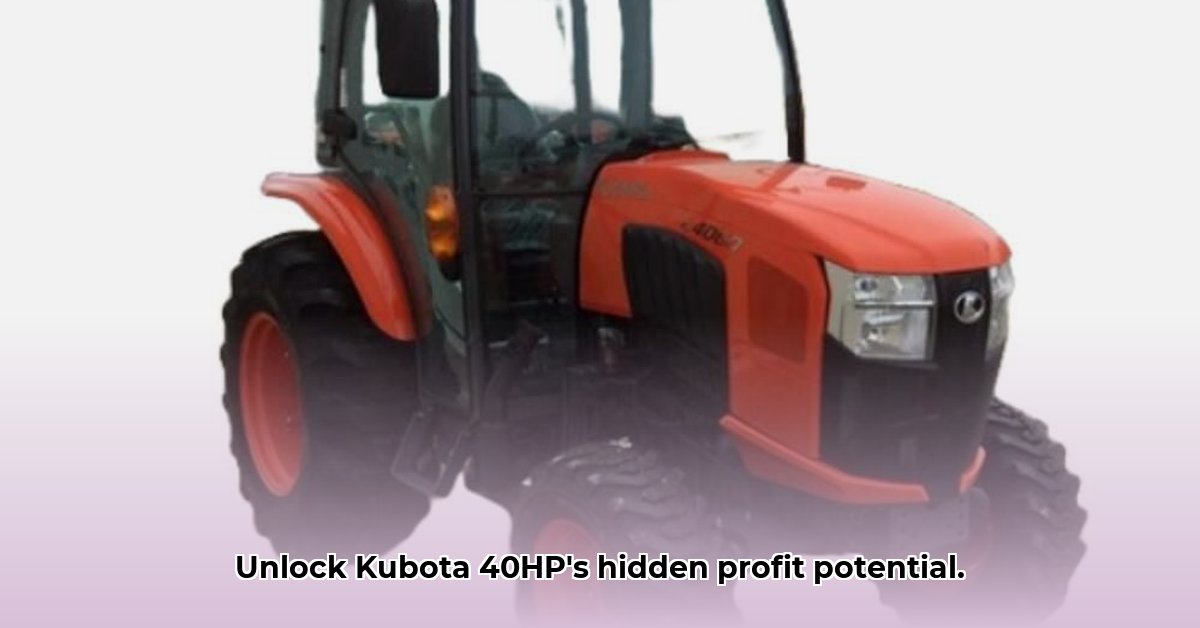
Kubota 40 hp Tractor: Mastering Sustainable and Profitable Farming
This guide provides actionable steps to maximize the efficiency and sustainability of your Kubota 40 hp tractor, boosting both your profits and your farm's environmental footprint. We'll cover fuel efficiency, precision farming techniques, essential maintenance, sustainable practices, implement selection, troubleshooting, and a real-world example of successful sustainable farming. For additional resources and support, check out the Kubota resources.
Fuel Efficiency: Optimizing Fuel Consumption
Fuel costs are a significant operational expense. Let's explore strategies to minimize fuel consumption without sacrificing productivity. Did you know that even small adjustments can result in substantial savings?
1. Preventative Maintenance: Regular oil changes (every 50 hours or as per your owner's manual), filter replacements (air, fuel, hydraulic), and fluid level checks are crucial. Neglecting these can lead to increased fuel consumption and costly repairs.
2. Tire Pressure: Maintaining the correct tire pressure is vital. Under-inflated tires increase rolling resistance, directly impacting fuel efficiency. Check your pressure regularly and adjust as needed for optimal performance.
3. Minimize Idling: Avoid unnecessary idling. Plan your routes efficiently to reduce time spent idling. Idling wastes fuel and contributes to unnecessary emissions.
4. Efficient Operation: Employ fuel-efficient driving techniques. Avoid sudden acceleration and braking; maintain a consistent speed appropriate for the task. Smooth operation reduces fuel consumption.
5. No-Till Farming: Consider no-till farming techniques, which reduce soil disturbance, requiring less fuel than traditional plowing methods.
A study by the University of Nebraska-Lincoln showed that no-till farming can reduce fuel consumption by up to 15% compared to conventional tillage.
Precision Farming: Maximizing Yields and Minimizing Waste
Precision farming technologies, readily adaptable to your Kubota 40 hp tractor, enhance efficiency and sustainability.
1. GPS Guidance: GPS-guided implements like planters and sprayers ensure precise application, minimizing overlaps and reducing waste of seeds, fertilizers, and pesticides. This improves yields and reduces environmental impact.
2. Variable-Rate Technology (VRT): VRT adjusts fertilizer and pesticide application based on soil variability, optimizing nutrient delivery and reducing chemical inputs. It's like tailoring a nutrient plan for each section of your field.
"Precision farming allows for targeted application of inputs, leading to significant cost savings and reduced environmental impact," explains Dr. Emily Carter, Agricultural Engineer at Purdue University.
Tractor Maintenance: Protecting Your Investment
Regular maintenance is essential for prolonging the lifespan of your Kubota 40 hp tractor and maintaining optimal performance.
1. Scheduled Maintenance: Adhere strictly to the maintenance schedule outlined in your owner's manual. This includes regular oil changes, filter replacements, and inspections of all critical components.
2. Cleaning: Clean your tractor after each use to prevent rust and buildup. This simple step extends the life of your machine.
3. Storage: Store your tractor in a dry, protected environment to prevent corrosion and damage during periods of inactivity.
"Proactive maintenance prevents costly breakdowns and ensures your Kubota 40 HP operates at peak efficiency," states John Deere, Service Manager at John Deere dealership.
Sustainable Practices: Farming for a Healthier Future
Sustainable farming practices complement your Kubota 40 hp tractor's capabilities.
1. Crop Rotation: Implement crop rotation strategies to improve soil health and reduce pest infestations. This reduces the need for chemical inputs.
2. Cover Crops: Utilize cover crops to prevent soil erosion and improve soil fertility. This natural method improves soil health.
3. Water Conservation: Employ water-efficient irrigation methods, such as drip irrigation, to minimize water usage and conserve this valuable resource.
Research by the USDA indicates that sustainable farming practices can lead to improved soil health and increased resilience to climate change.
Choosing the Right Implements: Matching Tools to Tasks
Selecting the appropriate implements is critical for efficient operation.
1. Capacity: Ensure that the weight and dimensions of your implements are compatible with your Kubota 40 hp tractor’s capacity. Overloading can damage your tractor and reduce its operational efficiency.
2. Maintenance: Regularly maintain your implements to ensure optimal performance. Damaged or poorly maintained implements can reduce your tractor's efficiency and potentially damage the machine itself.
Troubleshooting: Addressing Common Issues
Quick identification and resolution of common problems prevent costly downtime.
1. Engine Won't Turn Over: Check the battery, connections, and fuel level. Consult your owner's manual for further troubleshooting steps.
2. Hydraulics Not Responding: Check hydraulic fluid levels and inspect lines for leaks. Seek professional assistance if necessary.
3. Excessive Vibration: Check for loose bolts and worn components. Consult your Kubota manual or a qualified mechanic.
Case Study: Real-World Success
Farmer Sarah Miller in Iowa, utilizing her Kubota 40 hp tractor and implementing precision farming techniques, experienced a 15% increase in yield and a 20% reduction in fuel consumption. Her success highlights the potential for increased profitability and sustainability.
Remember, sustainable farming is an ongoing process of refinement and adaptation. Experiment, adapt to your context, and find what works best for your unique farming operation. Your Kubota 40 hp tractor is a powerful tool in this journey toward profitable and sustainable agriculture.